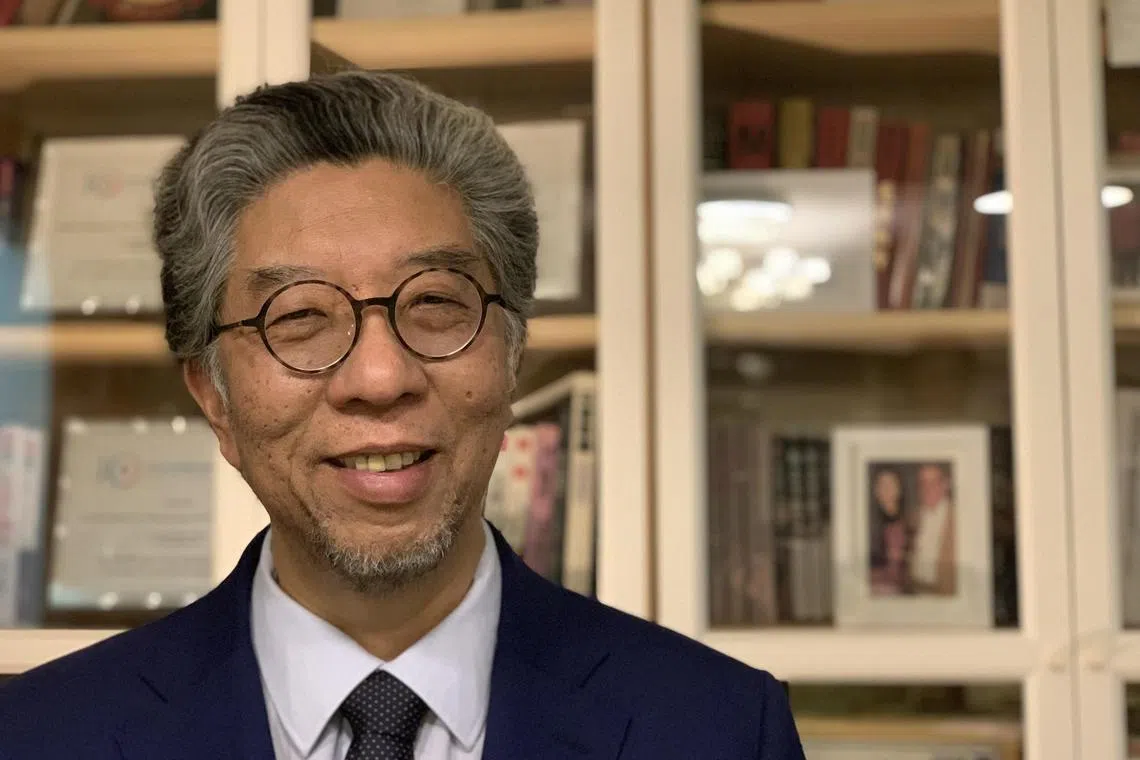Journalist Benjamin Kang Lim, ‘towering figure’ in covering China, dies at age 65
Sign up now: Get ST's newsletters delivered to your inbox

Mr Benjamin Kang Lim had broken stories such as the death of paramount leader Deng Xiaoping in 1997 and the surprise rise of President Xi Jinping in 2007.
PHOTO: ZHANG XINXIN
Follow topic:
BEIJING – One of the longest-serving correspondents in China, Mr Benjamin Kang Lim
During an illustrious journalism career spanning four decades, Mr Lim had broken some of the biggest stories out of China, including the death of paramount leader Deng Xiaoping in 1997 and the surprise rise of President Xi Jinping in 2007.
Mr Lim spent 27 years with news agency Reuters, including heading its Taipei and Beijing bureaus, before retiring in 2018. He came out of retirement in 2019 and was global affairs correspondent for The Straits Times, based in Beijing.
“Ben Lim left quite a sterling record. He was an intrepid reporter, multilingual and gregarious,” Philippine Ambassador to China Jaime FlorCruz, a long-time friend and news channel CNN’s former Beijing bureau chief, told ST.
“He was plugged in with good sources. A seasoned China analyst, he was good at providing depth and context to complex issues. He was also a kind and collegial peer, even towards his competitors. He was generous at sharing his reporting tips, especially with young reporters and newcomers.”
Mr Lim earned the trust of Chinese government officials, party cadres and entrepreneurs in a country where politics and business dealings are shrouded in secrecy by “becoming their friend first”, as he would say to younger correspondents.
He took note of his friends’ and sources’ birthdays and would unfailingly send greetings when the time came every year.
“China is a society built on relationships. This is a culture that has existed for thousands of years,” he had said in a previous interview when speaking about the importance of cultivating guanxi, or personal relationships.
The tip-off on Mr Deng in 1997 came from a good friend, whom Mr Lim had persuaded to send him a specific pager code signalling the Chinese leader’s death, he recounted in the interview.
ST editor Jaime Ho said: “I was fortunate to have been able to meet Ben in Beijing, soon after taking on this job. His reputation as an astute China watcher and the strength of his work had obviously preceded him. He will be deeply missed by the newsroom, and all those in our industry who call him a friend.”
Mr John Ruwitch, who worked with Mr Lim in the early 2000s at Reuters in Beijing, described him as a consummate newsman – “driven, principled, fair and, most of all, relentless in his pursuit of scoops”.
“For years, Ben’s stories shed light, like no one else could, on elite politics in China, helping the world understand a little better what was happening inside the proverbial black box,” said Mr Ruwitch, an international correspondent with America’s National Public Radio.
Born in Manila in 1959 to immigrant parents from the Chinese province of Fujian, Mr Lim decided to study Chinese in Taipei when he was 19, driven in part by his love for Chinese martial arts films. He later worked for Taiwan English-language paper The China Post and news agency Agence France-Presse, before joining Reuters in 1991.
Mr Lim had interviewed numerous Asian leaders who have since stepped down, including Chinese president Hu Jintao, Chinese premier Wen Jiabao, Taiwan’s presidents Chen Shui-bian, Ma Ying-jeou and Tsai Ing-wen, and Philippine president Gloria Macapagal Arroyo, as well as the late Philippine president Benigno Aquino III.
In 2016, he published a Chinese book, Taking China’s Pulse.
The Foreign Correspondents’ Club of China paid tribute to him as a “towering figure in China reporting and dear friend of the club”. It noted that Mr Lim broke the news in 2005 of the death of Mr Zhao Ziyang, the former Communist Party general secretary purged after the 1989 Tiananmen crackdown and put under house arrest until he died.
“Throughout this period, many China watchers and correspondents benefited greatly from his work and knowledge, whether directly or indirectly, as well as his support and encouragement,” said the club in a statement.
In response to a question by ST, the Chinese Ministry of Foreign Affairs said that Mr Lim had contributed to improving mutual understanding between China and the world.
Mr Lim was a witness to the country’s reform, opening up and progress, a ministry spokesman said.
“Throughout his career in journalism, Mr Lim was diligent and dedicated, earning the respect of his peers and readers,” he added.
“We are deeply shocked and saddened by the unfortunate passing of Mr Lim,” the spokesman said, adding that China is “willing to provide assistance to his family”.
Mr Lim is survived by his wife and daughter.


